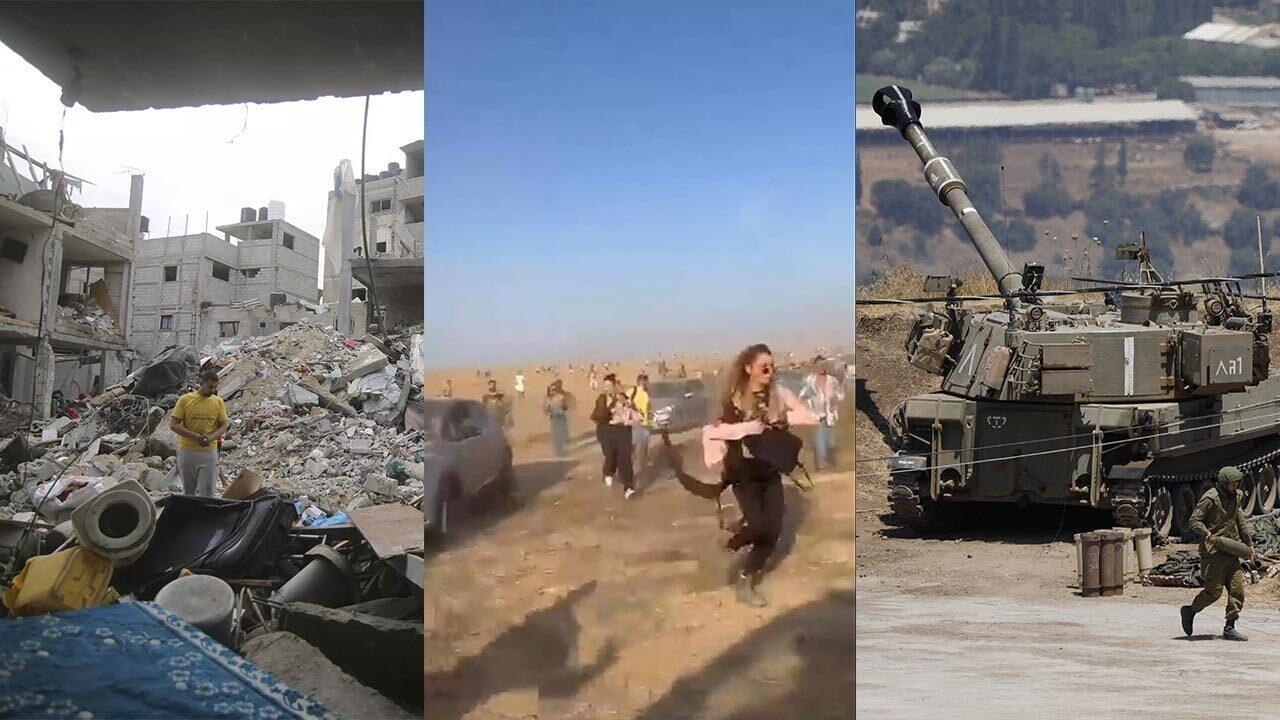
Israeli Prime Minister Benjamin Netanyahu promised “mighty vengeance” against Hamas following its dramatic surprise incursion into the country on Saturday, October 7, all the while emphasising the importance of rescuing the “significant numbers” of hostages now being held. As families mobilise to find their missing loved ones, Israel must balance tough trade-offs.
In a video circulated on social media, a 25-year-old Chinese-Israeli named Noa is shown being kidnapped by men on motorcycles as she attends the “Tribe of Nova” music festival in southern Israel‘s Negev desert. Since the surprise offensive by Hamas against Israel on Saturday, dozens of videos of this nature have gone viral, causing an international outcry.
According to Israel, around a thousand members of terrorist group Hamas took part in the large-scale operation of bombings and armed raids. With clashes still ongoing on Monday in several locations, hundreds of deaths and dozens of abductions have already been recorded.
Israeli hostages, including military personnel and “women, children, babies, elderly individuals, and the disabled”, are being held “in significant numbers” in Gaza, acknowledged Netanyahu on Saturday.
On Sunday evening, a senior Hamas official confirmed that the group was holding over 100 people hostage following the assault on Israel. Al Qassam, Hamas’ armed wing, claimed to be holding “dozens” of Israeli soldiers “sheltered in safe places and resistance tunnels”, including “high-ranking officers”.
The head of Palestinian Islamic Jihad also stated in a televised speech that his group was holding dozens of “Israeli prisoners” in Gaza.
Noa was partying in the south of Israel in a peace music festival when Hams terrorists kidnapped her and dragged her from Israel into Gaza.
Noa is held hostage by Hamas.
She could be your daughter, sister, friend.#BringBackOurFamily pic.twitter.com/gi2AStVdTQ
— Hen Mazzig (@HenMazzig) October 7, 2023
Families without answers
Parents and relatives of the missing held a press conference on Sunday in Tel Aviv, expressing their despair and calling on the government for help.
Like Noa, Merav Leshem Gonen’s daughter was attending the “Tribe of Nova” music festival ten kilometres from the Gaza Strip when it was attacked by armed men. Speaking at the conference, Gonen describes the last time she heard from her daughter, who called her while hiding from the attackers. “I’m on the phone with her and I’m saying ‘we love you’ and ‘it’s ok’,” Gonen says. “I know I’m lying because we don’t have answers.”
According to preliminary reports, about 250 people died during the attack on the music festival while several others were kidnapped by armed men.
For Vincent Lemire, a historian and former director of the French Research Centre in Jerusalem (CRFJ), the events of the weekend mark a turning point for the entire country. “It’s unprecedented in the history of the Israeli-Palestinian and Israeli-Arab conflict,” he says. “The population is completely traumatised.”
Dual and foreign nationals are also among those taken hostage. Israeli Ambassador to the United States Michael Herzog indicated that American citizens had been taken hostage. According to the Thai foreign ministry, eight Thai labourers were wounded, 12 killed and 11 taken captive. And at least eight French citizens are still missing, “deceased or taken hostage by Hamas”, according to Meyer Habib, an MP representing French citizens abroad, including in Israel.
Avidan est entre les mains du Hamas !!
Son père, médecin, vient de me le confirmer. Comme nous le redoutions, ce jeune Français originaire de Bordeaux, est bien pris en otage par ces barbares du Hamas.Au delà d’Avidan, au moins huit Français sont disparus ou pris en otage par…
— Meyer Habib (@Meyer_Habib) October 9, 2023
Several German-Israelis have been also reported kidnapped by Hamas by the German foreign ministry, which did not specify the number of individuals involved.
CNN journalist Anderson Cooper spoke to German-Israeli Ricarda Louk, who says she recognised her daughter unconscious in a car with Palestinian militants in a video online.
To assist families in their search for loved ones and to try to coordinate information, the Israeli police and civil defence have opened a “command centre for missing persons” in Lod, 15 kilometres southeast of Tel Aviv.
Bargaining chips
The abduction of soldiers and civilians complicates the IDF’s retaliation, says Héloïse Fayet, a Middle East specialist at the French Institute of Foreign Relations (IFRI).
“We know that Israel places a high value on its hostages,” says Fayet, recalling the case of the Franco-Israeli soldier Gilad Shalit, exchanged in 2011 for over 1,000 Palestinian prisoners.
On Monday, Hamas announced that four “prisoners” had been killed in Israel’s retaliatory strikes on Gaza. “Will the government be willing to sacrifice the hundred Israeli or dual nationals as hostages to neutralise the Hamas threat through a large-scale aerial operation?” asks Fayet.
A second option for Israel is to conduct a ground operation in Gaza, but this also involves serious risks, says Lemire. “There will be hundreds of [IDF] casualties because they will have to retake Gaza street by street,” he says.
According to Israeli media, the army has mobilised 300,000 reservists, an unprecedented move in Israel’s history. However, Netanyahu has shown little inclination to conduct ground campaigns in Gaza thus far in his long political career.
“The cruel reality is that Hamas has taken hostages as insurance against Israeli retaliation, especially a massive ground attack, and to exchange them for Palestinian prisoners,” Aaron David Miller, a senior fellow at the Carnegie Foundation for International Peace, told Reuters.
Negotiating the release of the hostages is the most likely outcome, says Lemire. “It is currently difficult to see how a far-right government and ministers like Ben Gvir [Minister of National Security] and Smotrich [Minister of Finance] could bear the political cost,” says Lemire. “But from my perspective, it is the most likely option. In the past, Israel has always negotiated to secure the release of its hostages.”
According to estimates, around 4,500 Palestinians are currently being held in Israel, convicted or awaiting trial for “terrorist activities”. “Our detainees in [Israeli] prisons, their freedom is looming large. What we have in our hands will release all our prisoners,” said Saleh al-Arouri, deputy chief of Hamas’s political bureau in an interview with Al-Jazeera, in anticipation of future negotiations.
This article has been translated from the original in French.
This post was originally published on this site be sure to check out more of their content.







